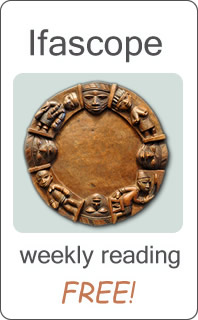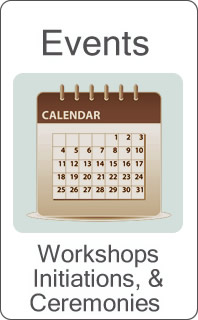How to judge a Babalawo
If a Babalawo asks the wrong questions, he will get the wrong answers! "How can this be," you might ask, "isn't it Orunmila talking?" The answer is that yes, Orunmila is talking, but he demands an intelligent conversation!
Just as there are incompetent lawyers, plumbers or physicians, there are incompetent Babalawo. Simply because you have been initiated, doesn't make you competent or wise. That may be a heretical thing for a Babalawo to say, but it is not only true, it is way past time someone said it. And, the danger of being guided by someone who doesn't know what they are doing, or, equally frightening, has their own agenda, primary to yours, can be absolutely catastrophic.
The ancient Yoruba were a very wise people. In the cultural context of their time, they created a system that tended to weed out the incompetent, unintelligent and those of questionable character and dedication before they could be unleashed on the populace with the title of Babalawo. The arduous apprenticeship period, where the would be Awo was asked to do menial labor to assist the Babalawo, extended for years. The strict disciplines of having to learn and memorize hundreds of pataki as they applied to specific Odu, to learn the sacrifices, herbs and medicine, went on for an equally long period of time. In the end, ONLY the word, or approval, of the Babalawo, based on judging the knowledge, character and dedication of the apprentice determined if they would go on to practice. While surely, some rogues, dolts and incompetents undoubtedly slipped through the net, they were by far the minority.
In our culture, no such safeguards exist. With the exception of the Ifa Foundation, which grants scholarships to those deemed worthwhile, but who lack the financial where with all for initiation, the office of Babalawo has become a strictly cash business. If you can afford it, someone will initiate you. Worse yet, for the most part, the individuals leave their initiations with no real training, or foundation, for future learning. This is not an indictment of all those doing initiations. Many, such as the Ifa Foundation, try and work with those of good character, offer the follow up training and growth.but the singular truth in our culture of short term gratification, is that too many use their initiation as a stepping stone for personal power, enrichment or control, rather than as a never ending journey of wisdom and knowledge.
The Yoruba expression: "It is easier to change a man's destiny then his character," might well have been constructed to highlight this danger.
When it is a question of character, there is little that can be done. Those that use their power for their own personal short-term gratification ultimately do themselves and the philosophy no good. Yet, they leave a host of victims in their wake. Honest, needy and trusting individuals who have come for the universal guidance and wisdom of Orunmila are stripped of their dignity and dollars by the unscrupulous.
When it is a question of competence, something can be done.both for them and to protect you. In order to understand this, you must understand the power and meaning of divination.
Too many individuals have taken the paternalistic view of Western Religion, and attempted to transfer it to Ifa. They would like the Babalawo to magically cast, magically fix, and magically protect them. It does not work that way.and anyone trying to tell you, or sell you, that it does, is either fooling them or you. Ifa is about personal empowerment, and the Babalawo's role is to ascertain how you can reach the balance in your life to achieve it. While it is true that the changes can be magical, they can only be consistently achieved through your personal growth and development. The Babalawo that attempts to infantalize you, through the use of fear, dependence, or power, is denying you your basic rights of growth, wisdom and development.and generally doing so for his personal gratification and desires.
So, you must go to the Babalawo looking for growth as well as solutions. Looking for personal development and fulfillment is as important as looking to fix whatever is troubling you.
There is still another area that can cause individuals grief. That has to do with the training and modality of the Babalawo. Another incredibly profound Yoruba saying is: " A Babalawo is as good as the questions they ask."
If a Babalawo asks the wrong questions, he will get the wrong answers! "How can this be," you might ask, "isn't it Orunmila talking?" The answer is that yes, Orunmila is talking, but he demands an intelligent conversation! If a Babalawo asks that that they already know, or if they go to illogical extremes of questions and specificity, the answers will not only be suspect, they will generally be totally wrong!
Divination is designed to help the individual achieve balance in their life, not to select between the red or yellow blouse. It is the assumption, and a correct one, that once your life is in balance, the specifics will tend to fall into place. Yet, young, or uneducated, Babalawo after Babalawo become so fascinated with the concept of being able to ask questions of the Opele or Ikin, that they turn a profound communication with a divine energy into a chat room gossip exchange. When they do this, the perfection of the information evaporates and becomes as silly and meaningless as the questions they ask.
A Babalawo can go down this road for two reasons.each, equally destructive to the client. First, they may do so because the client wants (and believes) the Babalawo can fine-tune their universe for them. This occurs most often when the client wants to go beyond the overall advice and wisdom of the reading. For example, if they have come because a monetary issue is troubling them, they find it not enough that the Babalawo casts and finds them on path, with good monetary implications. They hear the answer to their problem, but they insist on fine tuning the advice. They want to go on to see, " is my sales call to ABC Corp. going to be successful? " will I get the $4500 raise?" can I re-finance my house?" When you bring this kind of specificity to the table, after having received the critical information that "you are on path and money will be favorable," you are making two critical mistakes. Initially, you are confining your view to those areas that you know about.while Orunmila is looking at a much bigger picture. You may win the lottery, your great Aunt Nellie may die and leave you a fortune, you may have a new job offer coming, yet you want to know how the next 20 minutes on YOUR agenda is going to go. Well, that's not what divination is about. Also, in some way you are questioning Orunmila. He has just told you money will be fine, but you know want to "make sure." That is insulting to Orunmila, and may well be rewarded with wrong answers. The wise Babalawo should attempt to dissuade the client from this questioning, but too often simply lets the client run amuck in their desire for absolute certainty.
That is not to suggest that there are no issues where specificity of questioning isn't appropriate. What it is saying is that if a competent and well-trained Babalawo looks at the overall energy of your Odu, and ascertains your path, that 90% of the time the solution to your specific questions will be contained in the advice given. The advice is designed to bring your spiritual and temporal energy matrixes in balance. The specifics will fall into their proper place once this balance has been achieved. The untrained Western Babalawo, who has grown up believing that our world is a result of accumulating things, will unwittingly follow this worldview to the detriment of the client.
The second, and more frightening reason, is because they are attempting to gain power, control or influence over the client. In this case, by continuing down the path of asking enough questions (which they "know" are not true) they will eventually be able to show the client that Orunmila has supported their contentions. This occurs as a result of Orunmila providing the wrong answers to questions for which the trained Babalawo should have known better than to ask, or to which they already knew the answers. The Truth of Orunmila is not available to the untruthful behavior and bad character of those whose primary interest is their own personal satisfaction rather than improving the client's life. The number of Babalawo who have bedded clients, slandered other professionals, and generally used the assumed power and accuracy of divination for their own enrichment, anger or self gratification is astonishing. It is also reprehensible. . In a universe constructed by an all-knowing and powerful God, it would be logical that one of the primary tools He provided for our guidance would function only when treated with, and used with, the respect, knowledge and good character that benefits all. So, quite simply, Babalawo of bad character or improper training will not receive the clarity and accuracy of Orunmila's wisdom
How do you protect yourself from this? How can you make a judgement about the individual in whom you place your trust? Just as you would, or should, not go to a doctor, attorney or stockbroker without carefully examining their background, you should do the same with the Babalawo you deal with. Talk to some of their clients, ask those who have dealt with them what their results have been. And, you should go one step further. You should examine their lives. If their lives do not reflect meaningful and loving relationships, general success and happiness, then you are at the very least dealing with someone who has not yet learned the proper use of Orisa energy.. And, at very worst, misuses it. Look, if they can't make their own lives good, how in the world can they help you?
Hopefully, as the Ifa Foundation and others organizations and individuals of good character continue to bring our work proudly to a public forum, as opposed to hiding in secrecy, more and more people will see that objective judgments regarding talent, training and character can, and must, be made if our use of this divine energy is to lead us to fulfillment and wisdom.
Blessings,
Oluwo Philip Neimark
Click here to return to classroom




